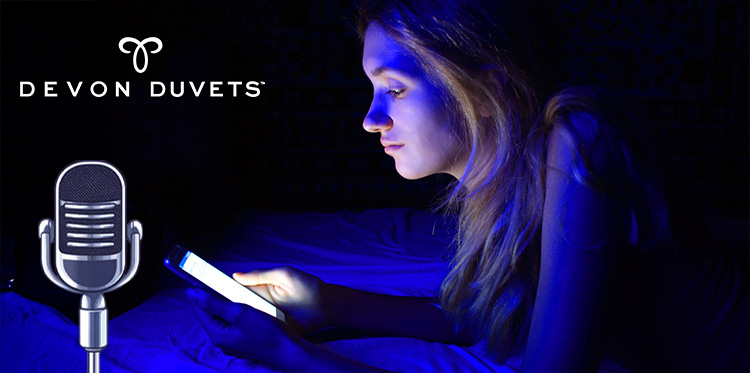Why Screens Are Disrupting Your Sleep

At Devon Duvets, we understand that creating the perfect sleep environment is about more than just what you sleep under or on – it’s about your lifestyle habits too. One of the most common yet overlooked sleep disruptors is something almost all of us use daily: screens.
Whether it’s your phone, tablet, television or laptop, the light emitted from digital devices can have a significant effect on your ability to fall - and stay - asleep. So it’s good to know that even small changes can make a big difference.
The science behind blue light and sleep disruption
Screens emit what's known as ‘blue light’. This is a high-energy visible light that mimics daylight. Whilst this isn’t a problem in the morning or afternoon, in the evening and throughout the night it can cause sleep issues.
Your body operates on an internal clock known as the circadian rhythm. As daylight fades, your brain naturally begins producing melatonin, a hormone that signals to your body that it is time for sleep. For this reason, melatonin is often called the ‘sleep hormone’. However, blue light from TV screens and devices has been shown to suppress this melatonin production, making it harder for your body to wind down.
A landmark study published in PNAS (Chang et al., 2015) confirmed that reading on a light-emitting device before bed significantly delayed sleep onset, reduced REM sleep, and left participants feeling less alert the next day. In a nutshell, your late evening screen time could be making your nights restless and your mornings groggy.
How can I reduce the effects of screens on sleep?
Here are some simple, research-backed strategies to help you achieve that all important wind down before bedtime:
Limit screen time before bed: Aim to switch off all screens at least one hour before sleep. This will give your brain the chance to produce melatonin naturally and let your body know that it’s time to wind down.
Use blue light filters: Many modern devices offer a night mode or blue light reduction setting. You can also wear blue light blocking glasses, which studies (Burkhart & Phelps, 2009) have shown to be effective in improving sleep quality when worn in the evening. Best of all is to keep TVs and devices out of the bedroom and then the problem of blue light is solved!
Swap screens for soothing routines: Tempting though it might be, scrolling through social media just before bedtime can wind you up – rather than down. Replace late-night scrolling with calming activities such as reading a physical book, listening to gentle music or journaling. These low-stimulation habits help prepare both mind and body for sleep.
Dim your environment: In the hour before bed, turn off harsh overhead lighting and opt for softer, warmer lighting to simulate dusk and encourage melatonin production.
Does my sleep environment matter too?
Reducing screen time is only one part of the picture. Sleeping in a natural, breathable environment also plays a key role in helping your body relax. That’s why at Devon Duvets, we individually handcraft our duvets, toppers and pillows using high grade traceable 100% British wool and luxurious natural cotton fabrics, woven to our strict specifications from cotton fibres certified by Better Cotton. Our products are natural, sustainable and chemical free.
When it comes to bedding, wool has a number of benefits. It's not only temperature regulating but also resistant to dust mites and naturally antibacterial. So, when your bedtime routine is supported by healthier habits and healthier materials, you’re increasing your chances of a more restful night.
Frequently Asked Questions (FAQs)
Does blue light really affect my sleep?
Blue light affects your sleep by suppressing melatonin, the hormone responsible for making you feel sleepy. Exposure to blue light in the evening, particularly from TVs and devices, can trick your brain into thinking it’s still daytime - and that can delay sleep and reduce overall sleep quality.
How long before bed should I stop using screens?
Experts recommend turning off screens at least 60–90 minutes before bedtime. This gives your body time to naturally transition into sleep mode and begin producing melatonin. The earlier you switch off, the better your sleep outcome is likely to be.
What is the best way to reduce screen-related sleep problems?
The best approach is to combine strategies: limit evening screen time, use blue light filters or glasses, replace screen time with relaxing activities like reading, and ensure your bedroom lighting is soft and warm. Together, these habits help align your body with its natural sleep rhythm.
Is it OK to use a Kindle or e-reader before bed?
If your e-reader emits blue light (like a tablet), it can disrupt your sleep. However, non-backlit e-readers such as Kindle Paperwhite (with the light turned low or off) are much less disruptive. When in doubt, a traditional printed paperback is the safest bet.
Can natural bedding really help with sleep quality?
Natural bedding, like our handcrafted wool duvets, toppers and pillows, helps to regulate body temperature, wick away moisture, and provide a calm, breathable environment and thereby support better, less disrupted, sleep. Combined with good habits like reducing screen time, natural bedding can dramatically enhance your rest.
To find out more about our award-winning range of wool duvets, pillows and mattress toppers, visit us at www.devonduvets.com. If you have any queries or would like to discuss your specific sleep requirements with the team, then get in touch via email or by calling 01752 345399.


